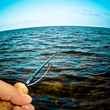While the U.S. has passed laws that require sharks to be landed whole, many shark populations continue to plummet, partially because U.S. fishermen and seafood brokers are still trading in fins in an attempt to cash in on demand that threatens sharks worldwide.
Not only is shark finning—the process of slicing off a shark's fins and disposing of the body at sea—cruel, wasteful, and 100% contrary to a conservation-minded ethos, demand for these fins drives shark populations down which can have cascading impacts on entire ocean ecosystems—including those where fly anglers flock to chase bonefish, tarpon, permit and more.
Currently before Congress is the Shark Fin Sales Elimination Act (H.R. 737), which offers the opportunity for the U.S. to put a big dent in the demand for fins by banning participation in the shark fin trade.
Congress needs to seize this opportunity to act before our nation embarrasses itself further on the global fisheries conservation stage and before we push sharks closer to extinction.
Shark Fin Sales Elimination Act (H.R. 737)
Although shark finning is illegal in U.S. waters, fins can be sold as part of the whole shark or detached once the shark is on shore. There’s also the import/export trade. The United States imports thousands of pounds of shark fins every year. Some fins come from countries with lax or non-existent shark-fishing regulations, including countries that still allow shark finning. Even in the U.S., some shark populations aren’t managed sustainably. And we lack enough information on many U.S shark fisheries to know whether we’re fishing at safe levels, or not. In fact, we don’t even have adequate stock status data for over 62% of domestic shark stocks. For the 64 stocks for which we do have information, only 12 are not currently experiencing overfishing or already considered overfished.
Most shark species are easily overfished. Sharks have long lifespans and reproduce infrequently, giving live birth to offspring every few years.
By prohibiting the possession, sale and trade of shark fins in the United States, the Shark Fin Sales Elimination Act offers a practical way to improve enforcement of the current ban on finning sharks in U.S. waters, protect U.S. ecosystems and the fisheries they support, while reinforcing the status of the United States as a leader in shark conservation. In fact, passing the Shark Fin Sales Elimination Act would go a long way toward ending the worldwide scourge that is the shark fin trade.

Unlikely Nations Take the Lead
Having realized that it makes ecological and economic sense to protect sharks, many countries, including destinations important to the far-flung fly-fishing industry, have leapt ahead of the U.S. in terms of shark conservation. The Bahamas outright banned commercial shark fishing, sale, or trade in shark products, and Fiji banned commercial shark fishing. To date 17 nations including Venezuela, Palau, and the Cayman Islands have created shark sanctuaries. Their motivations include protecting fisheries, tourism revenues and ecosystems.
The ecosystem benefits provided by sharks don’t get enough attention despite the fact that healthy shark populations are vital to maintaining healthy ecosystems. As high-level or apex predators, sharks remove the weak and the sick from fish and invertebrate populations lower on the food web, and keep the food web in balance. Without sharks, near-shore habitats such as seagrass flats and coral reefs are more susceptible to algal blooms and diseases. That’s why famous tropical fly-fishing destinations such as The Bahamas, and the Los Roques Archipelago in Venezuela have protected their waters from commercial shark fishing.
State Bans Send Signal to Congress
Twelve states as well as three commonwealth territories banned the shark fin trade. These include Texas, California, Delaware, Illinois, Hawaii, Massachusetts, Maryland, Nevada, New York, Oregon, Rhode Island, and Washington, as well as Guam, American Samoa, and the Northern Mariana Islands. Other states may and should follow suit, especially Florida, the Fishing Capital of the World.
Florida has two of the world’s largest ports, the ports of Miami and Tampa. The Port of Miami holds the dubious distinction as the nation’s leader in the number of shark fins imported from Hong Kong.
During the winter months, droves of blacktip and spinner sharks migrate to the sapphire-clear waters in Palm Beach County. So do fly-fishermen from all over the world. Then and there, fly anglers have a unique opportunity to sight fish for those acrobatic species in shallow water. As the wary sharks approach the boat, an angler must gently land a dense fly close enough to the animal to get its attention, but far enough that the fly doesn’t spook the shark. Often, the shark will sip the fly as softly as a cutthroat trout sips a midge, but then send a reel spinning deep into its backing as the shark tears away from the boat and vaults skyward. It’s one of the world’s most exciting and challenging big-game fly-fishing opportunities. Whether anglers target the fish with fly or conventional tackle, most of the sharks are released alive. Anglers help researchers learn more about what the timing and drivers of the migration by tagging sharks and reporting landings of tagged fish.

An hour to the south, in Islamorada, fly-fishing for sharks on the flats is something that guides can offer visiting anglers year-round, even in bad weather. The community’s appreciation for sharks is so deep that it gave rise to the annual Shark Fly Tournament which benefits the We Fish for Kids Foundation. The foundation helps funds the Monroe County School system’s efforts to keep kids exercising and healthy. Tournament founders, directors and guide participants see their kids’ futures entwined with good shark management. It’s a catch-and-release tournament, and anglers are incentivized to release the fish quickly, unharmed, or they get no points for catching the shark.
In California and other Pacific states, state laws banning the shark fin trade may help protect the wildly popular offshore mako shark fishery, which attracts fly anglers from all over the world. Texas’ move to ban the trade likely helped protect one of the Lone Star State’s best kept secrets: its fly-fishing opportunities for sharks. Several fly-fishing world records for sharks were recorded by anglers fishing from Texas ports of call.
By banning the shark fin trade, Mid-Atlantic and New England states may have allowed a growing clan of fly-fishing guides and anglers target blue and mako sharks for the long haul.
State bans are a good step in the right direction—they produce tangible gains and send the signal that local and regional communities recognize the importance that sharks play in our ecosystems and economies—but enforcement of state bans is difficult as fins can still travel through interstate commerce. A federal ban is needed to remove the U.S. from this horrific trade once and for all.
Congress, let’s make it official: Please bring H.R. 737 to the House floor for a vote this year.






























Comments